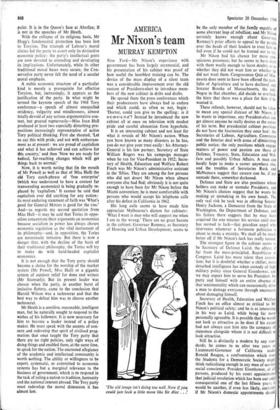Mr Nixon's team
AMERICA MURRAY KEMPTON
New York—Mr Nixon's experience with government has been largely ceremonial, and his presentation of his cabinet was proof of how useful the humblest training can be. The device of the mass display of a silent team was a considerable improvement over the old custom of Presidents-elect to introduce mem- bers of the new cabinet in dribs and drabs.
He spared them the press conferences which their predecessors have always had to endure and which could, as often as not, begin : 'Doctor, could you give us the spelling: is it S-C-H-U-L-T-Z'? Instead he introduced the new cabinet all at once on television with modest pride and careful abstention from hyperbole.
It is an interesting cabinet and not least for what it reveals of Mr Nixon's nature. When you have known as many disasters as he has, you do not give your trust easily : his Attorney- General is his law partner; Secretary of State William Rogers was his campaign manager when he ran for Vice-President in 1952; Secre- tary of Health, Education and Welfare Robert Finch was Mr Nixon's administrative assistant in the 'fifties. They are among the few persons who did not desert Mr Nixon when almost everyone else had fled; obviously it is not quite enough to have been for Mr Nixon before the Miami convention; he is most comfortable with persons who would accept his telephone calls after his defeat in California in 1962.
His long exile seems to have made him appreciate Melbourne's dictum for cabinets: 'What I want is men who will support me when I am in the wrong.' There are no great barons in the cabinet; Governor Romney, as Secretary of Housing and Urban Development, seems to 'The old image isn't doing too well. Now if you could just look a little more like Sir Alec . .
be the only member of the family capable of some aberrant leap of rebellion; and Mr Nixon certainly knows enough about Governor Romney's prior efforts to appeal to the people over the heads of their leaders to trust him to fail even if he could not be trusted not to try, Mr Nixon had his chance for more con- spicuous presences; but he seems to have dealt with them warily enough to leave doubts as to whether they did not want him or whether he did not want them. Congressman Quie of Min. nesota does seem to have been offered the port- folio of Agriculture and to have declined, and Senator Brooke of Massachusetts, the only Negro in that chamber, did decide to overlook the hints that there was a place for him if he wanted it.
These refusals, however, should not be taken to mean any special distrust of Mr Nixon; if he wants to importune, any President-elect can get almost anyone be really desires at the outset Of his term. But presidential cabinet positions do not have the fascination they once had: the Secretaries of Labour, Agriculture, Commerce and the Interior deal with areas of diminishing public notice; the only positions which engage matters of power and passion are those of Defence, Treasury, State, Education and Wel- fare and possibly Urban Affairs. A man can hardly hope to make a career anywhere else, and the troubles of Secretaries Rusk and McNamara suggest that careers can be, if not unmade there, somewhat darkened.
Defence and State are also positions whose holders can make or unmake Presidents, and Mr Nixon's choices suggest that he wants his making or unmaking in his own hands. The only real risk he took was in offering Senator Henry Jackson, a Democrat from the State of Washington, the Department of Defence; and his failure there suggests that he may have acquired the one retainer his service until now has seemed to lack—that guardian angel who intervenes whenever a fortunate politician is about to make a mistale. We shall all be much better off if Mr Nixon's luck has really turned.
The strongest figure in the cabinet seems to be Secretary of Defence Laird, the ablest, if far from the most-principled, Republican in Congress. Laird has more talent than convic- tion; but it is doubtful whether a chiller, more detached intelligence has taken custody of high military policy since General Eisenhower, and we may expect him to serve his President, his party and himself with an entire absence of that sentimentality which can occasionally drive a man to damage everyone through unconcern about damaging himself.
Secretary of Health, Education and Welfare Finch has an office almost as critical to Mr Nixon's political safety; and he is as interesting in his way as Laird, while being far more personally agreeable. It is possible that he would not look as attractive as he does if his career had not always cast him into the company of statesmen alongside whom it is not difficult to look attractive.
Still he is distinctly a modern by any stars• dards; he comes to us after two years as Lieutenant-Governor of California under Ronald Reagan, a confrontation which even the Students for a Democratic Society might think radicalising enough in any man of normal social conscience. President Eisenhower, of all persons, produced by his court appointments that judicial revolution which has been our only' consequential one of the last fifteen years; it would be another, if even less likely, curiosity if Mr Nixon's domestic appointments should Presage our first substantial social reform since the New Deal.
All in all Mr Nixon's bag is altogether better than one's imagination about his social list would lead one to expect. Those who are strangers are in places where they can't do much damage; and those who are acquaintances are men with qualities. Even if some of those qualities are not altogether winning ones, as in Secretary of Defence Laird's, they can be useful where he's going.



































 Previous page
Previous page